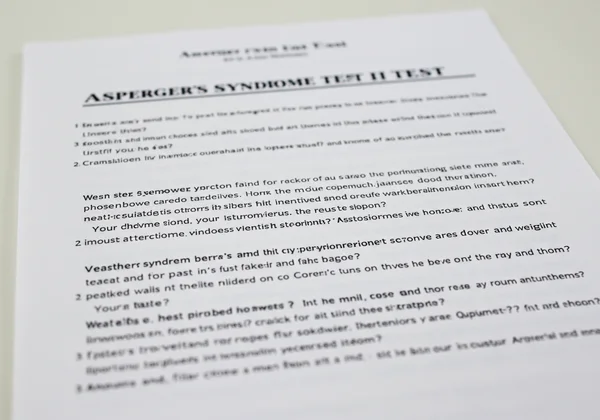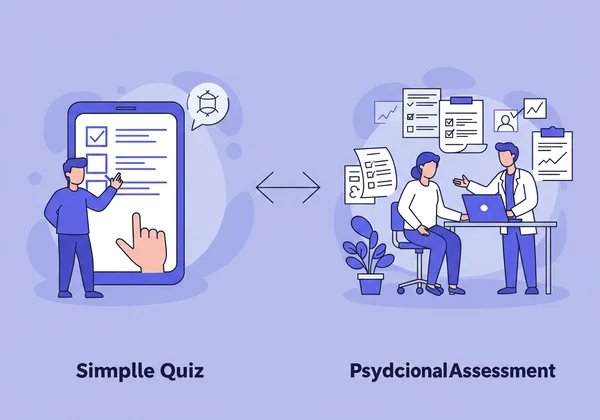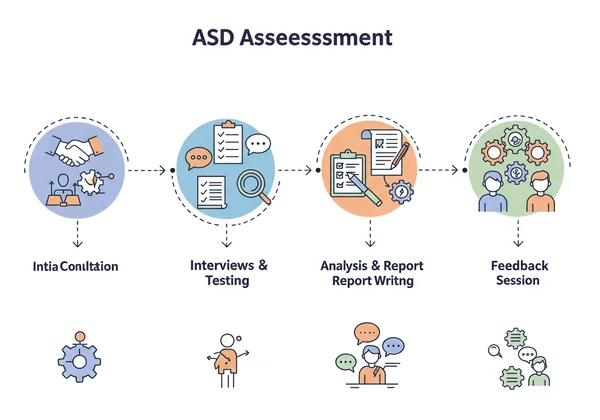Start Your Aspie Quiz Journey to Adult ASD Assessment
October 27, 2025 | By Leo Sinclair
Taking the Aspie Quiz can be a profound moment of recognition. For many adults, seeing a high score reflect their lifelong experiences is the first step on a path toward deeper self-understanding. What should I do if I get a high Aspie Quiz score? If you're asking this question, you're not alone. This guide provides a clear, step-by-step roadmap for navigating the process of seeking a professional autism assessment as an adult, helping you move from the initial insights of a self-quiz to informed, confident action. Your journey of exploration starts here, and understanding the next steps is a powerful way to continue it.

After Your Aspie Quiz: Why Consider a Diagnosis?
Receiving your results from an online tool like the Aspie Quiz Online can bring a mix of emotions—validation, confusion, and curiosity. It's a pivotal moment that often leads to a crucial question: what's next? For many, the answer involves considering a formal, professional diagnosis. This step isn't about seeking a label, but about gaining clarity and unlocking access to support tailored to your unique neurotype.
Is the Aspie Quiz a Formal Diagnosis? Understanding the Difference
It is essential to understand that the Aspie Quiz is a preliminary self-screening tool, not a formal diagnosis. Its purpose is to help you explore traits associated with the autism spectrum in a private, accessible way. It provides valuable insights based on your self-reported experiences and can be an excellent starting point.
However, a formal diagnosis can only be given by a qualified healthcare professional, such as a clinical psychologist or psychiatrist. They use comprehensive diagnostic tools, clinical interviews, and a review of your developmental history to make an assessment. Think of the Aspie Quiz as a well-designed map that suggests a destination; the professional assessment is the detailed, guided expedition to confirm it.

The Benefits of a Formal Autism Diagnosis as an Adult
Pursuing a formal assessment can offer significant benefits of diagnosis. For many adults who have felt "different" their entire lives without knowing why, a diagnosis can provide immense validation. It reframes past struggles not as personal failings, but as characteristics of a different neurotype.
This newfound understanding can improve self-esteem and provide a framework for self-compassion. Professionally, a diagnosis may grant access to workplace accommodations. Personally, it can help you communicate your needs more effectively to friends and family and connect you with a vibrant community of other neurodivergent individuals who share similar experiences.
Common Concerns & Potential Challenges When Seeking a Diagnosis
The path to seeking a diagnosis is not always straightforward. Common concerns include the financial cost, as assessments can be expensive and may not be fully covered by insurance. Long waiting lists are also a frequent reality, requiring patience and persistence.
Emotionally, the process can be draining. It often involves revisiting difficult childhood memories and confronting long-held insecurities. There is also the fear of not being believed or being misdiagnosed, particularly for women and individuals from marginalized communities whose traits may present differently. Acknowledging these potential challenges allows you to prepare for them and build a support system as you move forward.
Finding the Right Professional for Your Adult Autism Assessment
Once you decide to pursue a diagnosis, the next critical step is finding a qualified professional who has experience with adult autism assessments. The right clinician can make the difference between a validating experience and a frustrating one. It’s important to find someone who understands the nuances of how autism presents in adults, which can be very different from how it appears in children.
Who Can Diagnose Autism in Adults? Types of Specialists
Several types of autism specialists are qualified to diagnose autism in adults. These typically include:
- Clinical Psychologists (Ph.D. or Psy.D.): They are often experts in psychological testing and behavioral assessments.
- Psychiatrists (M.D. or D.O.): As medical doctors, they can diagnose autism and also rule out or identify co-occurring conditions, as well as prescribe medication if needed.
- Neuropsychologists: These professionals specialize in understanding the relationship between brain function and behavior, making them well-suited for complex diagnostic evaluations.
When searching for a provider, look for those who explicitly state they specialize in "adult autism" or "neurodiversity."
![]()
Preparing for Your Initial Consultation: What to Gather
To make the most of your consultation, it's helpful to prepare for assessment in advance. Gather any documents or notes that can provide a comprehensive picture of your life experiences. This might include:
- Your Aspie Quiz Results: Bring a printout or have your results from the online asperger's test available to share. It can be a great conversation starter.
- A List of Traits: Write down specific examples from your childhood and adult life that align with autistic traits (e.g., social communication difficulties, sensory sensitivities, intense special interests, preference for routine).
- School Records or Reports: Old report cards can sometimes contain valuable observations from teachers.
- Input from Family: If possible and comfortable, ask a parent or older relative for their memories of your early development.
Key Questions to Ask Potential Assessors
Before committing to an assessment, it's wise to ask assessors some key questions to ensure they are a good fit. This is your chance to interview them and gauge their expertise and approach. Consider asking:
- What is your experience with diagnosing autism in adults, specifically in my gender and age group?
- What does your assessment process involve? What specific tools or tests do you use?
- How do you incorporate self-reporting and personal history into your evaluation?
- What is the estimated cost, and do you offer a payment plan or accept insurance?
- What can I expect in the report I will receive after the assessment?
What to Expect During the Professional ASD Assessment Process
Knowing what the ASD assessment process entails can significantly reduce anxiety and help you feel more prepared. While the exact procedures can vary between clinicians, most adult autism assessments follow a structured format designed to gather comprehensive information about your life and experiences. It is an interactive and collaborative process, not just a simple test.
Overview of Common Assessment Methods and Tools
Clinicians use a variety of assessment methods to form a complete picture. These often include a combination of interviews, standardized questionnaires, and observational tasks. Some of the most common tools are:
- Clinical Interview: A detailed conversation about your developmental history, social relationships, communication style, sensory experiences, and special interests.
- Standardized Questionnaires: You might be asked to complete forms like the Autism Spectrum Quotient (AQ) or the Ritvo Autism Asperger Diagnostic Scale-Revised (RAADS-R).
- ADOS-2 (Autism Diagnostic Observation Schedule): This is a semi-structured, activity-based assessment that observes your social interaction, communication, and imaginative use of materials.
- ADI-R (Autism Diagnostic Interview-Revised): A structured interview, often conducted with a parent or someone who knew you well as a child, to gather information about your early development.
The Importance of Your Personal History and Self-Reporting
Your personal history is one of the most critical components of an adult assessment. Unlike with children, clinicians rely heavily on your ability to self-report your internal experiences and recall memories from your past. This is where the self-reflection you began when you decided to take the quiz becomes invaluable. Be honest and detailed about your challenges and strengths. Your lived experience is the most important piece of evidence in the entire process.
Understanding the Assessment Timeline and Follow-Up
The complete assessment timeline can take anywhere from a few weeks to several months. It usually involves one to three sessions for interviews and testing, followed by a waiting period while the clinician scores the tests, analyzes the data, and writes a comprehensive report. A final feedback session is then scheduled to discuss the findings, provide a diagnosis if applicable, and recommend next steps. This follow-up is your opportunity to ask questions and get a clear understanding of what the results mean for you.

Interpreting Your Diagnosis and Navigating Next Steps
Receiving a formal diagnosis is not an endpoint; it's a new beginning. It’s a key that can unlock a deeper understanding of yourself and open doors to new resources and communities. The journey after your diagnosis is about integrating this new piece of your identity into your life in a way that feels authentic and empowering.
What a Formal Diagnosis Means for You
A formal diagnosis can mean different things to different people. For many, it brings a profound sense of relief and clarity. It provides a name for a lifetime of experiences and allows you to connect with a community of peers. It is not a label that limits you, but rather a guide that can help you understand your strengths, anticipate your challenges, and advocate for your needs more effectively. This is the ultimate goal of the journey you started when you first searched for an aspie quiz.
Living with an Adult ASD Diagnosis: Practical Support & Strategies
Armed with this new self-knowledge, you can begin to explore practical support and strategies. This might involve:
- Seeking Therapy: Finding a therapist who specializes in autism can help you process the diagnosis and develop coping strategies.
- Understanding Sensory Needs: Identifying your sensory sensitivities and creating environments that reduce overload.
- Leveraging Strengths: Recognizing and leaning into your autistic strengths, such as pattern recognition, loyalty, and deep focus.
- Requesting Accommodations: Seeking reasonable adjustments at work or school to help you thrive.
Connecting with the Neurodivergent Community and Resources
One of the most powerful next steps is connecting with the neurodivergent community. Online forums like Reddit (e.g., r/autism, r/Aspergers) and other dedicated websites offer spaces to share experiences, ask for advice, and feel a sense of belonging. Finding your people can be incredibly affirming and can significantly reduce feelings of isolation. This connection is a vital part of the journey that often begins with a simple online tool designed to help you begin self-discovery.
Your Journey from Self-Quiz to Self-Understanding {#journey-self-understanding}
From the initial curiosity that led you to the Aspie Quiz to the deep self-reflection of a professional assessment, this journey is uniquely yours. Each step, whether it’s taking an online screener or speaking with a specialist, is an act of self-discovery and courage. The Aspie Quiz is a powerful starting point, offering a private and accessible way to explore your traits and decide what comes next.
Remember, the goal is not to fit into a box, but to understand your own beautiful, unique mind. Whatever you discover, let it empower you to build a life that is authentic, fulfilling, and true to who you are. If you’re ready to take that first step, or wish to revisit your initial insights, you can explore your traits on our platform.
Disclaimer: The Aspie Quiz is an online preliminary screening tool for self-exploration and is not a substitute for a professional medical diagnosis. The information in this article is for educational purposes only and should not be considered medical advice.
Frequently Asked Questions About ASD Assessments {#faq-asd-assessments}
Is the Aspie Quiz a diagnosis?
No, the Aspie Quiz is a self-assessment tool designed to help you identify traits associated with the autism spectrum. It is an excellent resource for self-exploration and can provide valuable insights, but it is not a formal medical diagnosis. A diagnosis can only be provided by a qualified healthcare professional after a comprehensive evaluation.
How accurate is the Aspie quiz for adults?
The Aspie Quiz is designed based on established criteria and traits associated with Asperger's and ASD. For many adults, it provides a surprisingly accurate reflection of their lived experiences and serves as a reliable indicator that further professional evaluation may be warranted. However, its accuracy depends on honest self-reflection, and it remains a screening tool, not a diagnostic instrument.
What should I do if I get a high Aspie Quiz score?
A high score suggests you may share many traits with individuals on the autism spectrum. It’s a good starting point for further research and self-reflection. You can use your results as a basis for a conversation with a trusted friend, family member, or a healthcare professional. If you are seeking clarity, the next logical step would be to consult with a specialist in adult autism diagnosis, as outlined in this guide. You can always Explore Your Traits to prepare for that conversation.
Can a formal ASD diagnosis help me in daily life?
Yes, for many people, it can be incredibly helpful. A diagnosis can provide access to workplace or educational accommodations, guide therapeutic strategies, and improve self-awareness. Most importantly, it can give you a framework for understanding your needs and communicating them to others, leading to better relationships and reduced stress in daily life.
Where can I find resources after a diagnosis?
There are many excellent resources available. Online communities, like those on Reddit or dedicated neurodiversity forums, are a great place to connect with peers. National and local autism organizations often provide support groups, workshops, and lists of autism-friendly service providers. A good clinician will also provide you with a list of resources tailored to your specific needs after the assessment is complete.